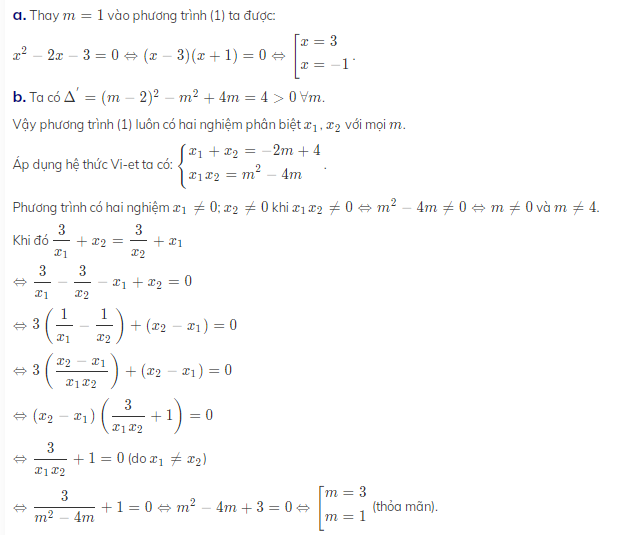Hãy nhập câu hỏi của bạn vào đây, nếu là tài khoản VIP, bạn sẽ được ưu tiên trả lời.

+\(\Delta=\left[-\left(m+1\right)\right]^2-4.1.\left(2m-3\right)\)
\(=m^2+2m+1-8m+12=m^2-6m+13=\left(m-3\right)^2+4>0\)
\(\Delta>0\Rightarrow\text{phương trình (1) có 2 nghiệm phân biệt}\)
+x=3
PT(1) trở thành : \(3^2-\left(m+1\right).3+2m-3=0\)
\(\Leftrightarrow-3m-3+2m+6=0\)
\(\Leftrightarrow-m+3=0\Leftrightarrow m=3\text{ Vậy với x=3 thì m=3}\)

a) Xét \(\Delta=\left(m+1\right)^2-2m+3=m^2+4>0,\forall m\)
Vậy PT luôn có 2 nghiệm phân biệt.
b) \(f\left(x\right)=x^2-\left(m+1\right)x+2m-3=0\)có nghiệm \(x=3\)khi và chỉ khi
\(f\left(3\right)=0\Leftrightarrow3^2-\left(m+1\right).3+2m-3=0\Leftrightarrow3-m=0\Leftrightarrow m=3\)

x2 - 2( m + 1 )x + 2m - 4 = 0
1. Δ = b2 - 4ac = [ -2( m + 1 ) ]2 - 4( 2m - 4 )
= 4( m + 1 )2 - 8m + 16
= 4( m2 + 2m + 1 ) - 8m + 16
= 4m2 + 8m + 4 - 8m + 16
= 4m2 + 20
Dễ nhận thấy Δ ≥ 20 > 0 ∀ m
hay phương trình luôn có nghiệm với mọi m ( đpcm )
2. Dù là nghiệm kép hay nghiệm phân biệt thì hai nghiệm của phương trình đều viết được dưới dạng
\(\hept{\begin{cases}x_1=\frac{-b+\sqrt{\text{Δ}}}{2a}=\frac{2m+2+\sqrt{4m^2+20}}{2}\\x_2=\frac{-b-\sqrt{\text{Δ}}}{2a}=\frac{2m+2-\sqrt{4m^2+20}}{2}\end{cases}}\)
Khi đó \(x_1^2+x_2^2=\left(\frac{2m+2+\sqrt{4m^2+20}}{2}\right)^2+\left(\frac{2m+2-\sqrt{4m^2+20}}{2}\right)^2\)
\(=\left(\frac{2m+2+2\sqrt{m^2+5}}{2}\right)^2+\left(\frac{2m+2-2\sqrt{m^2+5}}{2}\right)^2\)( em đưa 2 ra ngoài căn chắc chị hiểu )
\(=\left(\frac{2\left(m+1+\sqrt{m^2+5}\right)}{2}\right)^2+\left(\frac{2\left(m+1-\sqrt{m^2+5}\right)}{2}\right)^2\)
\(=\left(m+1+\sqrt{m^2+5}\right)^2+\left(m+1-\sqrt{m^2+5}\right)^2\)
\(=\left[\left(m+1\right)+\sqrt{m^2+5}\right]^2+\left[\left(m+1\right)-\sqrt{m^2+5}\right]^2\)
\(=\left(m+1\right)^2+2\left(m+1\right)\sqrt{m^2+5}+m^2+5+\left(m+1\right)^2-2\left(m+1\right)\sqrt{m^2+5}+m^2+5\)
\(=2\left(m+1\right)^2+2m^2+10\)
\(=2\left(m^2+2m+1\right)+2m^2+10\)
\(=2m^2+4m+2+2m^2+10=4m^2+4m+12\)
3. Em mới lớp 8 nên chưa học Min Max mấy dạng này chị thông cảm :(((((((((
à xin phép em sửa một tí :))
1. ... = 4m2 + 20
Dễ nhận thấy Δ ≥ 20 > 0 ∀ m
hay phương trình luôn có hai nghiệm phân biệt với mọi m ( đpcm )
2. Vì phương trình luôn có hai nghiệm phân biệt nên hai nghiệm đó luôn viết được dưới dạng : ...
em quên nhìn cái " luôn có hai nghiệm phân biệt " sorry chị :(

a) \(\Delta=\left(m-1\right)^2-4.\left(-m^2+m-2\right)=5m^2-6m+9=4m^2+\left(m-3\right)^2>0\)
nên phương trình ( 1 ) luôn có hai nghiệm phân biệt
b) PT ( 1 ) có hai nghiệm trái dấu
\(\Leftrightarrow\hept{\begin{cases}\Delta\ge0\\P< 0\end{cases}}\Leftrightarrow\hept{\begin{cases}4m^2+\left(m-3\right)^2\ge0\\-m^2+m-2< 0\end{cases}\Leftrightarrow\forall m}\)

1, Khi \(m=0\), PT(1) trở thành: \(x^2-x=0\Leftrightarrow x\left(x-1\right)=0\Leftrightarrow\orbr{\begin{cases}x=0\\x=1\end{cases}}\)
Vậy \(S=\left\{0;1\right\}\)
2, PT đã cho có \(a=1>0\)nên đây là 1 PT bậc 2
Lập \(\Delta=b^2-4ac=\left(2m+1\right)^2-4\left(m^2+m\right)=4m^2+4m+1-4m^2-4m=1>0\)
Do đó PT (1) luôn có 2 nghiệm phân biệt
3, \(x_1< x_2\)là nghiệm của PT (1) \(\Rightarrow x_1=\frac{-b-\sqrt{\Delta}}{2a}< \frac{-b+\sqrt{\Delta}}{2a}=x_2\)
Ta có: \(x_2-x_1=\frac{2\sqrt{\Delta}}{2a}=1\Leftrightarrow x_2=x_1+1\forall m\)
Do đó khi m thay đổi thì \(A\left(x_1;x_2\right)\)nằm trên đường thẳng \(y=x+1\)cố định.

a) \(\Delta=\left[-\left(m+3\right)\right]^2-4.1.m\\ =m^2+6m+9-4m\\ =m^2+2m+9\\ =\left(m+1\right)^2+8>0\forall m\)
Vậy phương trình luôn có 2 nghiệm phân biệt với mọi m.
b) Áp dụng hệ thức Vi-et, ta có:
\(\left\{{}\begin{matrix}x_1+x_2=m+3\\x_1x_2=m\end{matrix}\right.\)
Mà \(x_1^2+x_2^2=6\)
\(\Leftrightarrow\left(x_1+x_2\right)^2-2x_1x_2=6\\ \Leftrightarrow\left(m+3\right)^2-2m=6\\ \Leftrightarrow m^2+6m+9-2m=6\\ \Leftrightarrow m^2+4m+3=0\\ \Leftrightarrow\left(m+1\right)\left(m+3\right)=0\\ \Leftrightarrow\left[{}\begin{matrix}m=-1\\m=-3\end{matrix}\right.\)
Vậy \(m\in\left\{-1;-3\right\}\) là các giá trị cần tìm.
a, Ta có: \(\Delta=\left[-\left(m+3\right)\right]^2-4.1.m\)
\(=m^2+6m+9-4m\)
\(=m^2+2m+9\)
\(=m^2+2m+1+8\)
\(=\left(m+1\right)^2+8\)
Lại có: \(\left(m+1\right)^2\ge0\forall m\Rightarrow\left(m+1\right)^2+8\ge8\forall m\)
Vậy phương trình luôn có 2 nghiêm phân biệt
b, Theo hệ thức Vi-ét: \(\left\{{}\begin{matrix}x_1+x_2=m+3\\x_1+x_2=m\end{matrix}\right.\)
Theo bài ra:
\(x_1^2+x_2^2=6\)
\(\Leftrightarrow\left(x_1+x_2\right)^2-2x_1x_2=6\)
\(\Leftrightarrow\left(m+3\right)^2-2m=6\)
\(\Leftrightarrow m^2+6m+9-2m=6\)
\(\Leftrightarrow m^2+6m+9-2m-6=0\)
\(\Leftrightarrow m^2+4m+3=0\)
\(\Leftrightarrow m^2+m+3m+3=0\)
\(\Leftrightarrow\left(m^2+m\right)+\left(3m+3\right)=0\)
\(\Leftrightarrow m\left(m+1\right)+3\left(m+1\right)=0\)
\(\Leftrightarrow\left(m+1\right)\left(m+3\right)=0\)
\(\Leftrightarrow\left[{}\begin{matrix}m+1=0\\m+3=0\end{matrix}\right.\)
\(\Leftrightarrow\left[{}\begin{matrix}m=-1\\m=-3\end{matrix}\right.\)
Vậy với m=-1 hoặc m=-3 thì phương trinh trên thỏa mãn hệ thức

+Ta có: \(\Delta=\left(m+1\right)^2-4.\left(2m-3\right)\)
\(=m^2+2m+1-8m+12\)
\(=m^2-6m+12\)
\(=\left(m-3\right)^2+3>0\)
=>dpcm
+Thay x=3 vào phương trình x2 – (m + 1)x + 2m - 3 = 0
ta được: 32-(m+1).3+2m-3=0
<=>9-3m-3+2m-3=0
<=>-m+3=0
<=>m=3
Vậy m=3 thì phương trình x2 – (m + 1)x + 2m - 3 = 0 có 1 nghiệm bằng 3
\(x^2-\left(m+1\right)x+2m-3=0\)
+ Xét \(\Delta=\left(m+1\right)^2-4\left(2m-3\right)=m^2-6m+13=\left(m^2-6m+9\right)+4=\left(m-3\right)^2+4>0\)với mọi m thuộc tập số thực.
Vậy phương trình luôn có hai nghiệm phân biệt với mọi giá trị của m.
+ Phương trình có nghiệm \(x=3\) , thay vào phương trình , ta được :
\(3^2-\left(m+1\right).3+2m-3=0\Rightarrow m=3\)
Vậy m = 3